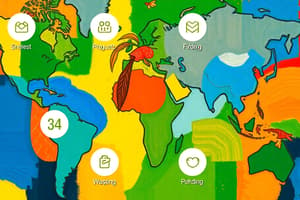Podcast
Questions and Answers
What is the primary limitation of using GDP as a measure of a country's development?
What is the primary limitation of using GDP as a measure of a country's development?
- It is difficult to calculate accurately
- It is only used by developed countries
- It does not account for non-market goods and services (correct)
- It only measures goods and services produced in a short time period
What is the GINI coefficient used to measure?
What is the GINI coefficient used to measure?
- Life expectancy
- Poverty rates
- Literacy rates
- Income inequality (correct)
According to the content, what is NOT measured by the GDP?
According to the content, what is NOT measured by the GDP?
- Value of non-market goods and services (correct)
- Distribution of income
- Market value of all final goods and services
- Value of goods and services resold
What is the purpose of creating alternative indicators of welfare?
What is the purpose of creating alternative indicators of welfare?
What is the main concern with using GDP as a measure of welfare?
What is the main concern with using GDP as a measure of welfare?
What is the main question that indicators of sustainable development aim to answer?
What is the main question that indicators of sustainable development aim to answer?
What is the limitation of the Environmental Kuznets Curve?
What is the limitation of the Environmental Kuznets Curve?
What is the main concern about the planet's ability to survive until all countries reach the turning point?
What is the main concern about the planet's ability to survive until all countries reach the turning point?
What is the main reason rich countries have been able to reduce pollution?
What is the main reason rich countries have been able to reduce pollution?
What does the ecological footprint measure?
What does the ecological footprint measure?
What is the world average ecological footprint per capita?
What is the world average ecological footprint per capita?
What is the formula for the Happy Planet Index (HPI)?
What is the formula for the Happy Planet Index (HPI)?
What does the Human Development Index (HDI) consist of?
What does the Human Development Index (HDI) consist of?
What is the main limitation of ISEW and GPI?
What is the main limitation of ISEW and GPI?
What is the SDG Index based on?
What is the SDG Index based on?
How many SDG indicators are used in the SDG Index?
How many SDG indicators are used in the SDG Index?
What is the relationship between the SDG Index and the scores on goal 12 and 13?
What is the relationship between the SDG Index and the scores on goal 12 and 13?
According to the environmental Kuznets curve, what happens to environmental problems as countries develop economically?
According to the environmental Kuznets curve, what happens to environmental problems as countries develop economically?
What is the main criticism of the environmental Kuznets curve?
What is the main criticism of the environmental Kuznets curve?
What is the main difference between the GDP and sustainability indicators like ISEW and GPI?
What is the main difference between the GDP and sustainability indicators like ISEW and GPI?
Flashcards are hidden until you start studying
Study Notes
Measuring Development
- GDP is not a suitable measure of welfare/wellbeing as it only measures the market value of final goods and services produced and sold in a specific time period.
- GDP does not account for:
- Non-market goods and services (e.g. housework)
- Distribution of income (inequality)
- Type of goods and services produced (e.g. cigarettes, weapons)
- Production methods (working conditions, working hours)
- Degradation of natural capital and externalities
Beyond GDP
- There is a need for alternative indicators of welfare that show a more complex picture of development.
- Examples of indicators based on GDP:
- Human Development Index (HDI)
- ISEW, GPI
- Sustainability indicators:
- Human Development Index (HDI)
- SDG Index
Human Development Index (HDI)
- Composed of:
- 1/3 life expectancy
- 1/3 education (2/3 literacy rate, 1/3 number of years in education)
- 1/3 GDP
ISEW, GPI
- Corrects GDP's weaknesses
- Very complex, often requires unavailable data
SDG Index
- Based on the UN SDGs
- Uses 119 SDG-indicators with widely available data
- Standardizes indicators (scores between 0-100) and aggregates them
- Gives equal weight to the 17 goals
- SDG Index and scores on goal 12&13 are negatively correlated
Environmental Dimension
- The environmental Kuznets-curve suggests that economic growth is initially bad for the environment, but after reaching a certain level of welfare, countries will devote more resources to solving environmental problems.
- However, the curve may not be true in reality:
- Only works for some types of pollution (those immediately harmful to health)
- No turning point or turning point at a much higher level of income for other types of pollution (e.g. GHG emissions, waste)
- Unclear if the planet can survive until all countries reach the turning point
- May not work on a global level due to rich countries "outsourcing" polluting activities to other countries
Ecological Footprint
- Measures the land area needed to support a given population on a given living standard for an unlimited amount of time
- Includes:
- Area needed to produce goods consumed
- Area needed to assimilate pollution and waste generated
- World average: 2.75 ha
- Available biocapacity/person: 1.63 ha
Happy Planet Index
- HPI = wellbeing (subjective life satisfaction) * life expectancy / avg. per capita ecological footprint
- An interesting idea that combines wellbeing and ecological footprint.
Studying That Suits You
Use AI to generate personalized quizzes and flashcards to suit your learning preferences.




